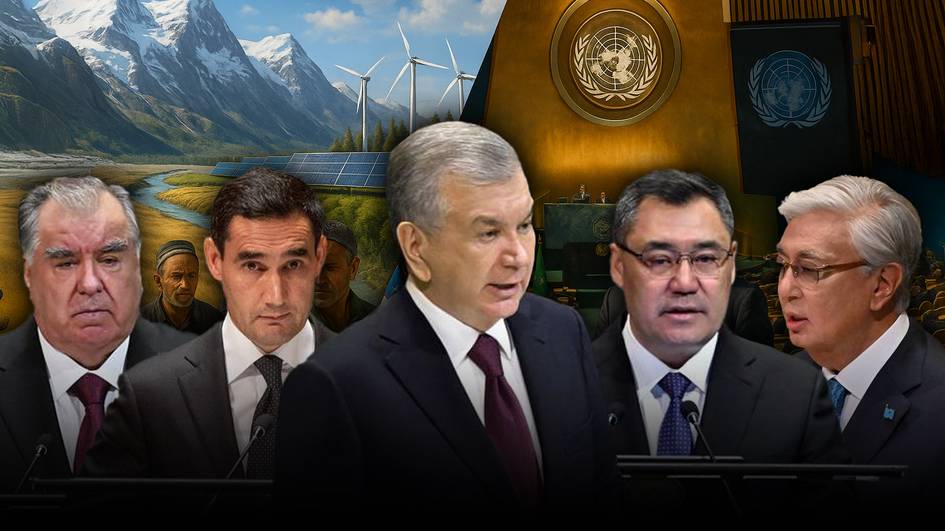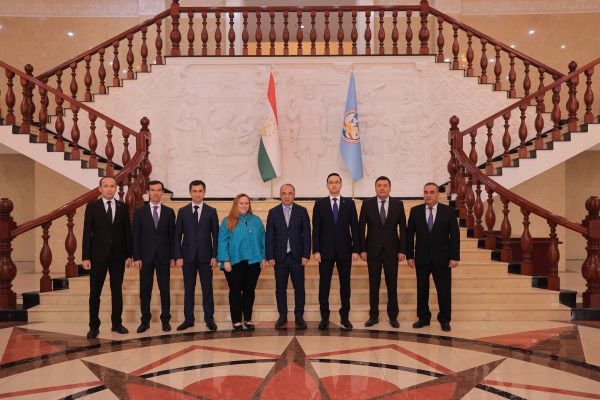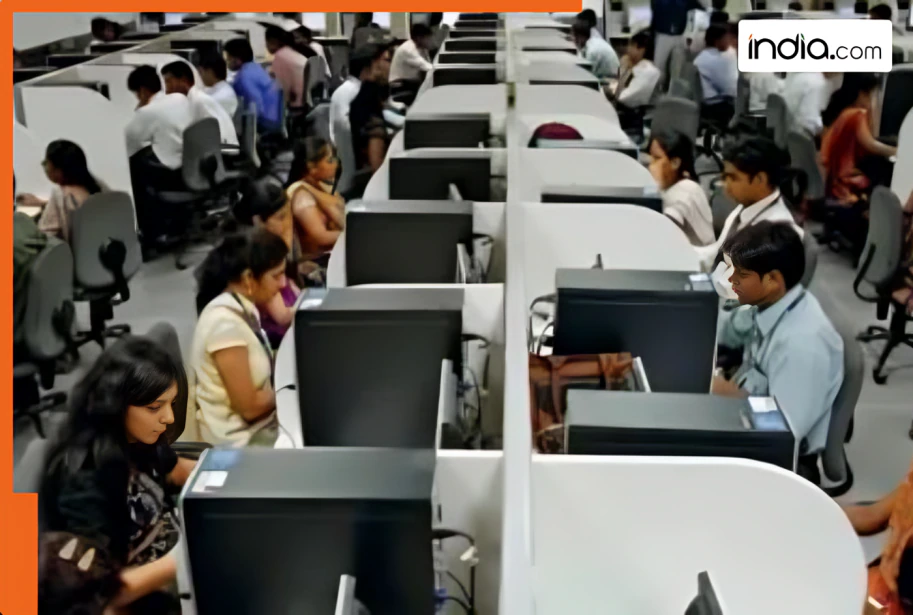By Online Service Group
Copyright daryo

For the five Central Asian republics, the United Nations is far more than a distant international institution according to Eldaniz Gusseinov, a columnist for Daryo and a Non-Resident Research Fellow at the Haydar Aliyev Center for Eurasian Studies. It is a guarantor of peace and stability in a volatile neighborhood, a partner in development and sustainability, and a platform for diplomatic engagement that elevates their international standing. Yet while the UN plays these indispensable roles, its institutional architecture still reflects the post-1945 order rather than the realities of the twenty-first century.
As new crises from water disputes to great-power rivalries reshape global politics, Central Asian states are pushing for reforms that make the UN more representative, more effective, and more aligned with their own security and development needs.
THE UN’S CRITICAL ROLE IN CENTRAL ASIA
The UN anchors the security and development agendas of the region. Its Regional Center for Preventive Diplomacy for Central Asia (UNRCCA), based in Ashgabat, provides mechanisms for dialogue, conflict resolution, and preventive diplomacy. It also supports the region’s new status as a “zone of peace, trust and cooperation,” a resolution adopted by the UN General Assembly in October 2024.
In August 2025, another milestone was reached with the launch of the UN Regional Center for Sustainable Development Goals (SDGs) for Central Asia and Afghanistan in Almaty. This Center was created to accelerate cooperation across the region, drive progress toward the 2030 Agenda, and extend support to Afghanistan. Its mandate covers economic growth, job creation, resilience, and integration into trade networks. It is also designed as a laboratory for ideas on climate adaptation, water management, youth employment, gender equality, digitalization, and smart infrastructure.
The Center acts as a hub linking governments, business, academia, and civil society. It prioritizes projects on sustainable economic growth, green technologies, smart cities, and responsible business practices. It also provides humanitarian and educational assistance to Afghanistan, with the explicit aim of promoting stability and laying the groundwork for long-term transformation, including women’s rights and education. In 2026 Kazakhstan will host a Regional Environmental Summit under UN auspices, coordinated through the Almaty Centre, underscoring the region’s growing capacity to shape global agendas.
On the security front, the UN coordinates responses to terrorism, extremism, and transnational crime, while helping neighbors build confidence in a region marked by fragile borders and histories of mistrust. It also plays a key role in cross-border water and environmental management. Finally, the UN elevates the diplomatic standing of Central Asian states by endorsing their initiatives on non-proliferation, peacebuilding, and integration.
Presidential Calls for Reform
The push for UN reform is not an abstract diplomatic exercise. It has been clearly articulated by each of the region’s presidents on the UN stage, with distinct emphases but a shared recognition that change is necessary.
Kazakhstan: Middle Powers and Disarmament
President Kassym-Jomart Tokayev has discussed that comprehensive UN reform is a strategic necessity. At the UN General Assembly, he emphasizes the expansion of regional representation in the Security Council to include major voices from Asia, Africa, and Latin America, while giving responsible Middle Powers, including Kazakhstan, greater influence through rotational seats and consultation mechanisms:
“Kazakhstan strongly believes that the voices of responsible Middle Powers also need to be seriously amplified in the Security Council. In fact, they have already started to play a larger positive role in international relations, bringing balance and building trust. They can act as bridges within the UN when major powers are divided or failing to resolve pressing issues of common concern.”
Tokayev has consistently presented Kazakhstan as a bridge-builder when great powers are deadlocked. He links reform to upholding sovereignty, territorial integrity, and peaceful conflict resolution, warning that selective application of the UN Charter undermines credibility. Astana also advances initiatives such as a UN agency for biological security, a new international dialogue on artificial intelligence, and stronger commitments to nuclear disarmament, pointing to Kazakhstan’s history of closing the Semipalatinsk test site as proof of leadership.
Uzbekistan: A New Central Asia and Social Transformation
President Shavkat Mirziyoyev highlights that the era of closed borders in Central Asia has ended, and the region has become an independent subject of international relations. He has welcomed UN reforms aimed at expanding cooperation for the SDGs, improving governance, and supporting new projects.
Uzbekistan’s initiatives include a General Assembly resolution promoting regional integration and forums such as the World Summit on Vocational Education, the Asian Women’s Forum, and a future World Forum on Water. Mirziyoyev has also called for the creation of a UN-backed regional hub for green technologies in partnership with UNIDO, and pressed for a UN Counter-Terrorism Office in Tashkent. With respect to Afghanistan, he advocates support for new transport and energy corridors, alongside an International Competence Center for rehabilitating individuals returning from conflict zones:
“We intend to implement large-scale economic and infrastructure projects in that country (Afghanistan). We propose to adopt a dedicated UN resolution on the development of transport and energy corridors of international significance through the territory of Afghanistan.”
Through these proposals, Uzbekistan positions itself as both a regional leader and a global innovator, seeking a UN that is more inclusive, development-oriented, and responsive to modern threats.
Kyrgyzstan: Equality of Small States
President Sadyr Japarov has focused his interventions on fairness and equality for small states. He noted that more than 60 UN members, including Kyrgyzstan, have never been elected to the Security Council, while others have occupied seats five or six times. Bishkek has put forward its candidacy for the Council in 2027–2028, insisting that every country has the right to influence decisions on global peace and security.
“We (World Community) can continue to build up arms, chasing security through military power, or we can choose a path of sustainable development aimed at eliminating poverty and supporting the most vulnerable. Resources directed to military needs could instead make a huge contribution to tackling global problems — whether ensuring access to clean water, providing education for children in developing countries, fighting hunger, or funding climate-change mitigation programs. Achieving progress in this direction requires coordinated efforts by both rich and poor countries.” – Japarov said.
Japarov also criticized sanctions that unintentionally harm states are small and called for the unfreezing of Afghanistan’s assets to stabilize its economy. His speeches reflect a strong plea for multilateralism that protects vulnerable states rather than marginalizing them.
Tajikistan: Climate and Water Diplomacy
President Emomali Rahmon has long championed water and climate issues at the UN. He was warned that Tajikistan’s glaciers, which provide up to 60% of Central Asia’s water resources, are disappearing at an alarming rate, with more than 1,300 already gone. Rahmon has advanced initiatives such as declaring an International Year of Glacier Preservation and promoting the “Decade of Action on Water for Sustainable Development.”
At the UN, he proposed a new “Decade of Peacebuilding for Future Generations” and highlighted the risks of food and water insecurity driven by climate change. For Dushanbe, UN reform is also about ensuring that environmental and mountain issues receive sustained attention, resources, and global recognition:
“Tajikistan supports effective and fair reforms of international financial mechanisms. At this stage, we observe uneven levels of economic development among states, and developed countries together with international financial institutions can play an effective role in addressing this situation. Many developing and least developed vulnerable countries still suffer from the consequences of economic and financial crises, poverty, infectious diseases including COVID, natural disasters, and the lack of food security.”
Turkmenistan: Neutrality and a Culture of Trust
President Serdar Berdimuhamedow has emphasized Turkmenistan’s policy of neutrality and proposed new UN initiatives to institutionalize this approach. At the UN he promoted the resolution “Neutrality for Peace and Security” and the idea of a World Summit on a Culture of Trust. He also suggested declaring 2026–2035 as the Decade for Sustainable Transport, advancing the Caspian Environmental Initiative, and supporting a UN Center on combating desertification.
Ashgabat’s proposals reflect a desire to entrench Turkmenistan’s neutral identity within the UN framework while contributing to global discussions on transport, environment, and energy.
Berdimuhamedow emphasized: “Neutrality is a tool for maintaining and strengthening international peace, security and sustainable development.”
WHY CENTRAL ASIA WANTS REFORM
Despite differences in emphasis, all five leaders converge on one point: the current UN system, especially the Security Council, no longer reflects global realities. For Kazakhstan and Kyrgyzstan, the priority is greater representation for middle and small states. For Uzbekistan, it is about integrating Central Asia into global decision-making and development frameworks. For Tajikistan, reform is tied to climate and water security. For Turkmenistan, it is linked to embedding neutrality and a culture of trust.
The broader rationale is clear. Central Asia faces overlapping crises that require a more responsive UN: instability in Afghanistan, water conflicts, great-power rivalries spilling into the region, climate shocks, and economic vulnerabilities. Reform is seen as essential to secure resources, authority, and effective preventive diplomacy.
REGIONAL CHALLENGES TESTING THE UN
The urgency of reform becomes even clearer when viewed against Central Asia’s geopolitical predicament.
Afghanistan and the Qosh Tepa Canal
Afghanistan’s instability remains the most pressing threat. Beyond terrorism and narcotrafficking, the Taliban’s construction of the Qosh Tepa Canal has triggered alarm across the region. The 285-kilometer project, intended to irrigate 500,000 hectares, could divert up to 30% of the Amu Darya’s flow.
Uzbekistan stands to lose at least 15% of its intake, threatening cotton production and food security. Turkmenistan could lose up to 80% of its share, endangering livelihoods and the Aral Sea basin. Kazakhstan may also be indirectly affected if Uzbekistan compensates by drawing more from the Syr Darya. Poor engineering, leakage risks, and the absence of Afghanistan from regional water agreements compound the danger. For Central Asian leaders, this is precisely the kind of transboundary challenge where a reformed UN must step in.
Great-Power Rivalries
War in Ukraine has disrupted remittances, exposed Central Asia to sanctions spillovers, and intensified pressure from both Moscow and Western capitals. Meanwhile, China, Turkey, Iran, the EU, and the United States all compete for influence in the region. Central Asian governments worry about being caught in the crossfire of great-power politics. UN reform is therefore not only about fairness, but about preserving space for multi-vector diplomacy in an increasingly polarized world.
Middle Eastern Instability
Escalation between Iran and Israel poses risks for trade, energy flows, aviation, and the security of Central Asian citizens working abroad. Balancing relations with both sides while avoiding entanglement is difficult without stronger multilateral frameworks. Here again, Central Asian leaders call for a UN capable of managing crises inclusively.
Climate and Demographics
The Aral Sea disaster, shrinking glaciers, population growth, and rising droughts underscore the region’s vulnerability. Climate change is not only an environmental issue but a driver of migration, food insecurity, and instability. Central Asia insists that UN reform must elevate climate diplomacy and provide resources for sustainable adaptation.
COLLECTIVE IDENTITY AND THE “ZONE OF PEACE”
Turkmenistan spearheaded a major step toward collective diplomacy when the UN General Assembly adopted resolution A/RES/79/5 on October 24, 2024, recognizing Central Asia as a “Zone of Peace, Trust, and Cooperation.” Co-sponsored by 37 countries, the resolution commended the region’s nuclear-weapon-free zone, its preventive diplomacy center, and the consultative meetings of Central Asian heads of state.
For the region, the resolution was not only symbolic. It institutionalized their peaceful identity, enhanced soft power, and legitimized regional integration under UN auspices. Central Asia now positions itself as both a contributor to global peacebuilding and a laboratory for multilateral innovation.
For Central Asia, the UN is indispensable. It supports preventive diplomacy, anchors sustainable development, and enhances international dignity. The new SDG Center in Almaty highlights how regional institutions can extend UN capacity while strengthening cooperation with Afghanistan. Yet the region also recognizes that unless the UN is reformed, it risks irrelevance in an era of complex transboundary threats.
By calling for fairer representation, more agile crisis response, and stronger preventive mechanisms, Central Asian states are not merely adding their voices to a global debate. They are articulating reforms grounded in their daily reality: exposure to Afghan instability, water conflicts, great-power rivalries, and climate shocks.
The message from Astana, Tashkent, Bishkek, Dushanbe, and Ashgabat is consistent. Reform is not a matter of prestige or symbolism. For them, reform of the UN is a strategic necessity, vital not only for the effectiveness of global governance but also for the survival, security, and prosperity of Central Asia itself.



